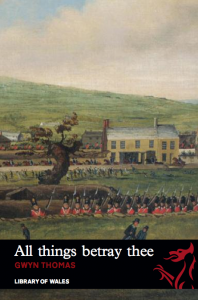Continuing his journey through the Library of Wales collection, Jon Gower finds much to admire in Gwyn Thomas’ All Things Betray Thee.
One might not automatically associate Gwyn Thomas with the historical novel but with this 1949 offering he both earns his spurs and demonstrates a deep respect for and understanding of the past. But the work is not without the usual Thomas verbal flourishes: in a big new grey-stone chapel ‘Mr. Bowen kept hell on a gilt leash’. Elsewhere a character avers that ‘mobility and cheap art are golden privileges in an age when man is sizing up the long dirty job of finishing his career as a starveling and a fool’. Yet the literary firework displays one usually attends in Gwyn Thomas’s novels are few and scanty: the prose of All Things Betray Thee is quieter, more sedate and unadorned, and more in keeping with weighty matters of personal and social conscience.
 Cast in the febrile 1830s, a time of social ferment and friction, of both the Newport and the Merthyr uprisings, this is a work also filled with music, and specifically harp music. One of its central characters, Alan Hugh Leigh is a travelling harpist, a man whose sometimes melancholic instrument touches all of his listeners:
Cast in the febrile 1830s, a time of social ferment and friction, of both the Newport and the Merthyr uprisings, this is a work also filled with music, and specifically harp music. One of its central characters, Alan Hugh Leigh is a travelling harpist, a man whose sometimes melancholic instrument touches all of his listeners:
Around my harp, in all the villages of all the hills and valleys where I had stayed for a brief night or day, had crystallised whole layers of expressed longings and regret. Then, after each session of playing and singing, I had felt the layers peel away under the aseptic brush of wind and sun, for there was that within me which set a fence around my pity and bade all other men and women let me be and pass.
As the novel opens the peregrinating harpist is without a harp, as a drunk farmer had smithereened the instrument after an altercation, leaving it as nothing more than a pile of splinters. The harp-less Alan is looking for his friend, the singer and activist John Simon Adams, and in doing so wanders a world filled with unfairness, where hill farmers with their ‘will and muscles made the hard land made soft and made wheat grow where people said it would not’ see that land appropriated by aristocrats, backed up by the military, driving the people off the land like foxes. And as if the yeomanry’s bayonets weren’t threat enough, there’s always the spectre of transportation, punishing Australian exile doled out by harsh judges, or, should they see fit, death by hanging. To raise one’s voice in protest is a dangerous act.
The novel, set in the Merthyrish iron town of Moonlea lays bare the process by which individual ire melds into collective grievance, as men grow to understand that they can better fight for their beliefs by standing together, and marching in step. They make for a stirring spectacle:
Then, below me, five great veins of redness pressed to the surface of the night. The legions were coming up from the south, men bearing torches in their ranks, making for the foot of the mountain on which I stood. I looked fascinated at the broad streams of brightness that came closer, clearer.
The protests in Moonlea are part of something bigger, a movement forming and fomenting in big cities such as London, Manchester and Birmingham.
As the Moonlea men gather and group together, the ironmasters bring in more soldiers, fully intent on breaking the troublesome, collective spirit and to keep the Moonlea furnaces burning bright and profits high. In this instance, in this struggle, in this novel, the men will be, and are defeated, but their spirit remains unvanquished, seeding a certain hope for the future.
At novel’s end, as Alan the harpist climbs up the hill known as Arthur’s Crown, surveying as he does so the house of the ironmaster, Penbury, beneath him, he walks away from the town, ‘away from Moonlea, yet eternally towards Moonlea, full of a strong, ripening, unanswerable bitterness, feeling in my fingers the promise of a new enormous music’.
That Janus moment, simultaneously turning away from the iron town, and at the same time towards Moonlea might be the same poised moment where the future learns from the past, where union members study the lessons of social struggle, in that school of very hard knocks. But where they also hear the self-same strains of a new, enormous music, destined to be impossible to contain.
All Things Betray Thee











